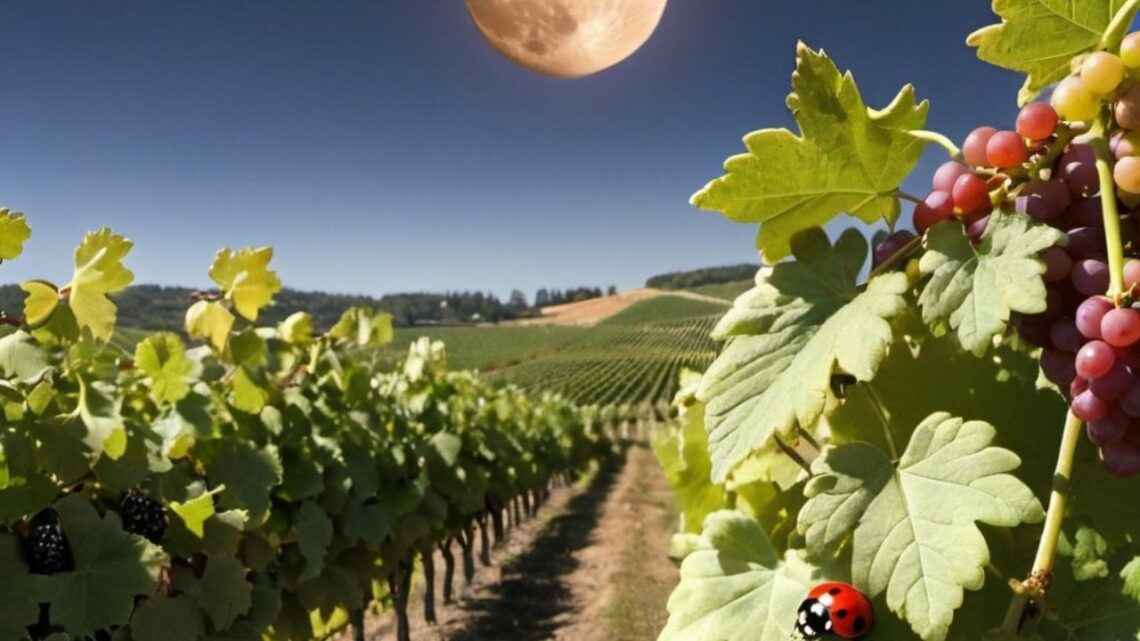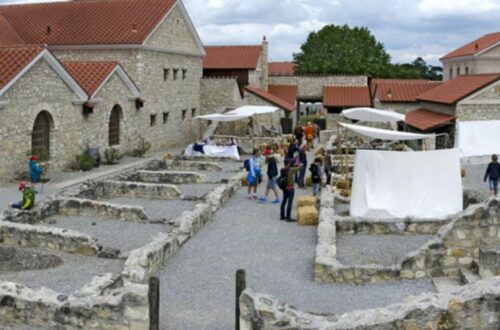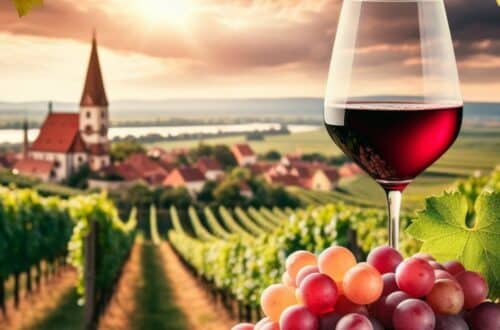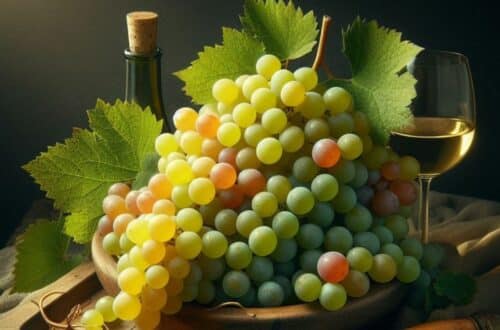
Biodynamic Winemaking In Austria
Austrian vineyards are not just about growing grapes.
Well it is.. But it’s mostly about growing grapes in harmony with nature. We’ve talked about the importance of sustainability in Austria winemaking and we’ve covered the organic aspect of it.
Now let’s take it a step further and talk about biodynamic winemaking in Austria.
There, vineyards are treated like living, breathing ecosystems.
Let’s dive into the world of biodynamic winemaking in Austria, where sustainability and top-notch quality go hand in hand!
Austria takes biodynamic winemaking seriously, with a philosophy that emphasizes a holistic farm ecosystem and sustainability. This approach is booming, with growth exceeding 50% in recent years. Biodynamic winemakers in Austria use natural methods like diverse plantings, composting, and minimal intervention to create healthy grapes and unique wines. This eco-friendly approach is backed by organizations like Demeter and Respekt Biodyn and championed by successful wineries like Nikolaihof, Gut Oggau…
The Philosophy of Biodynamic Winemaking
In Austria, they’re big on a special way of making wine called biodynamic winemaking.
It’s all about seeing how everything on a farm is connected, like a big team working together. It’s not just about avoiding chemicals; it’s about having a diverse bunch of plants, animals, and soil pals, all helping each other out.
Now, let’s talk about the secret sauce—biodynamic preparations. These are like special mixes made from natural stuff to make the soil healthy, help plants grow, and keep pests away.
They use a special calendar that follows the moon and stars to decide when to use these mixes. It’s like a cosmic guide for farming!
Speaking of rhythms, biodynamic winemakers follow this calendar for everything, from planting and harvesting to composting. They believe it helps their vineyards groove with the natural world, creating a happy balance.
As every movement, there is a leader, a pioneer. And this one comes with the name Rudolf Steiner.
He was born in Austria (at the time, now it’s Croatia), studied in Vienna, and wrote extensively on various subjects, including literature and philosophy. Importantly for wine enthusiasts, he gave a key lecture on agriculture in 1924, which kickstarted the biodynamic movement.
In a nutshell, biodynamic winemaking isn’t just about tasty grapes; it aims to support the development of nature and people, ensuring ecological, economic, social, and emotional sustainability.
In simple words : it helps the soil stay awesome, cuts down on using outside stuff, and makes sure there’s a bunch of different life forms hanging out. Got it?
Biodynamic Practices in Austrian Vineyards
Biodynamic winemakers utilize plant strengtheners, manure-filled cow horns, cow horn silica, and various plant extracts to support the process.
Guiding Principles of Biodynamic Viticulture
Diversity in their vineyards :They plant different crops between grapevines to make the soil happy, attract helpful insects, and keep away the weeds. Wildflowers also join the party, giving a home to bees and other good bugs that make the vineyard a happy place.
Composting : Winemakers also make piles with grape leftovers, twigs, and animal poop, turning it into super-nutrient compost. This compost feeds the soil, helping it stay healthy and hold onto water and nutrients.
Special mixes : they use special mixes made from natural stuff to keep the soil and plants super happy. One mix, called horn manure, is made from cow poop and helps plants grow strong. Another mix, silica spray, is made from crushed crystals and boosts plant health.
Pest management : instead of using strong chemicals, biodynamic winemakers keep a natural balance in their vineyards. They bring in good bugs, plant helpful plants, and set traps with special smells to confuse pests.
Hand harvesting: in biodynamic winemaking, they like to pick grapes by hand, which lets them carefully choose only the best, ripest ones. This hands-on approach is all about feeling connected to the vineyard, putting a personal touch into every part of making the wine.
Spontaneous Fermentation with Natural Yeasts: they let the grape juice do its thing naturally. Instead of adding special yeasts, they allow the yeasts that live on the grapes and in the vineyard to kickstart the fermentation. This makes the wine more interesting, capturing the unique flavors of the place where the grapes grow.
Minimal Use of Sulfur: they use sulfur just a little bit. It’s a preservative often used in wine, but here they keep it to a minimum. They also consider the moon and stars when deciding when to use sulfur.
Consideration of Planetary Constellations in Soil Cultivation and Cellar Work: Biodynamic winemakers pay attention to the moon and stars not only in the vineyard but also when working with the soil and in the cellar. They time their activities based on these cosmic events, believing it helps create a special connection between the vineyard and the larger universe. I
Two key organizations : Demeter and respekt-BIODYN
Of course, I can’t talk about biodynamic winemaking principles without mentionning the two essential organizations that make the rules of the game: Demeter and respekt-BIODYN.
Demeter Austria, as the local arm of the global Demeter association, has 54 member wineries, proudly holding the title of the world’s oldest organic association.

On the other hand, respekt-BIODYN, introduced to Austria in 2007, unites over 30 wineries dedicated to advancing biodynamic wine production.

Both Demeter and respekt-BIODYN adhere to similar biodynamic regulations, with specific codes of practice for their members, and their certification assumes compliance with organic viticulture standards.
With stringent codes of practice, Demeter Austria makes harvesting by hand mandatory and allows only spontaneous fermentation or the use of the winery’s own yeast.
Only organic spontaneous malolactic fermentation using indigenous lactic acid bacteria is permitted, while organic fining agents like egg white are prohibited, making Demeter-Austria-certified wine vegan.
Turning to respekt-BIODYN, mandatory practices include the use of 100% respekt-BIODYN-certified grapes, harvesting by hand, and spontaneous fermentation.
The rules here cover a lot, from saying no to animal-based fining agents to steering clear of stuff like gelatine and copper citrate.
The focus on steering clear of unnecessary changes and keeping things simple shows the dedication to making wines that truly reflect the vineyard’s unique character.
The Benefits of Biodynamic Wine
In Austria, making wine with biodynamic practices isn’t just about the vineyards; it’s a whole approach that leads to wines with amazing taste and some extra perks.
Richer Flavors and Smells : Biodynamic wines are famous for having a richer taste and smell. They bring out the best in grapes by taking care of the whole vineyard ecosystem.
Healthier Grapes :Using biodynamic methods makes grapes super healthy, and healthy grapes are the key to awesome wines. By focusing on good soil, biodiversity, and natural ways to handle pests, the grapes become resistant to diseases and packed with nutrients. This leads to wines with a perfect balance, less sugar, and more antioxidants that might be good for your health.
Eco-Friendly Goodness : Biodynamic winemaking isn’t just great for taste; it’s also a friend to the environment. It boosts soil health, prevents erosion, and skips the use of synthetic chemicals that can harm nature. Plus, it helps store carbon, doing its bit to fight climate change.
Prominent Biodynamic Winemakers in Austria
As of 2022, Austria had a total of 1,444 hectares of biodynamically farmed vineyards, with 15% of Austria’s organic vineyards already farmed biodynamically. In the last five years, the biodynamically cultivated area under vine has almost doubled.
Nikolaihof Wachau, nestled in the picturesque Wachau Valley, stands as a trailblazer in Austrian biodynamic winemaking since 1971.
Renowned for their Grüner Veltliners, Rieslings, and Blaufränkisch wines, they embody elegance and deep respect for the land.
Saahs and Nikolaus, the owners, initially faced ridicule and isolation but embraced biodynamic farming inspired by anthroposophy. Their conviction in cultivating healthy soil and plants led them through uncertain beginnings.
Reflecting on those early days, Saahs recalls a seasoned farmer advising them to “take a step in the right direction.” Despite challenges and skepticism, they remained steadfast. Saahs emphasizes the importance of the will invested in work for the future and the greater good.
The journey wasn’t easy; journalists criticized their unconventional methods. Their resilience and dedication eventually garnered trust. Saahs credits their free-spirited upbringing for allowing them to weave their own thoughts through experiences and be open to change.
Exporting wine extensively in the 1980s facilitated international acceptance. In 2005, their children took over, solidifying the estate’s foundation.
Nearly 50 years into biodynamic farming, Saahs considers it an incredible stroke of luck. She believes it not only imparted meaning to her life but also allowed her to pass on this blessing to her children.
Gut Oggau : In Burgenland, Gut Oggau is all about serious commitment to biodynamic winemaking. They produces expressive wines that really show off the unique character of the region, with their high acidity, minerality and complex aromas.
Tschida & Gindl : Heading over to Burgenland’s Eisenberg region, Tschida & Gindl are shaking things up with their innovative approach. They’re dedicated to making wines that truly express the region’s character. Whether it’s Grüner Veltliner, Blaufränkisch, Pinot Noir, or Syrah, you can also expect wines with lively acidity, minerality, and complex aromas.
Umathum :”It’s crucial to have an outside perspective,” says Umathum, who grew up in a winemaking family.
Despite initially planning to leave the wine industry and studying geography, he found himself drawn back to it during university in the early 1980s.
After exploring different wine regions, he returned home in 1985, right after the Austrian wine scandal. Facing challenges in convincing his vineyard crew, he delved into learning about biodynamics through lectures and reading.
While it initially seemed “mystical,” the key, he says, is learning to observe nature differently. After 35 years of alternative farming, he believes biodynamics go beyond winemaking, offering depth, strength, and beauty.
It’s not just about making better wines; it’s about tasting wines differently and undergoing personal growth, changing one’s view of nature and embracing a holistic human experience.
And that’s only a few names from the top of my head… But there’s many more (leave a comment and add to the list!)
Ready to Explore? Here’s How:
Visit Biodynamic Wineries
Take a wine tour and experience the magic of biodynamic winemaking in person.
Meet the passionate winemakers and soak in their dedication.
And to support this in your own way, join this biking tour : great wine and an environmental-friendly means of transportation.
Check Online Retailers
Dive into the world of Austrian biodynamic wines online. Many retailers offer curated selections and expert recommendations, making your exploration easy, such as Organic Wine Exchange.
Hit Up Wine Festivals
Immerse yourself in the biodynamic wine scene by attending festivals and events. Taste a variety of wines and learn all about the philosophy behind them.
To help you, I drafted a whole calendar!
Connect with Winemakers
Get social!
Reach out to biodynamic winemakers on social media or drop them an email. Ask questions, learn about their approach, and explore their wines from the comfort of your home.
Join a Wine Club
Consider joining a wine club (such as this one) that’s all about Austrian biodynamic wines.
You’ll get access to exclusive bottles and chances to learn more about what makes these wines special. Get my full review here.
The Future of Biodynamic Winemaking in Austria
Austria’s biodynamic winemaking scene is on the rise, and it’s not slowing down anytime soon.
Indeed, the number of biodynamic wineries in Austria has increased by over 50% in the past decade. Sales of biodynamic wine in Austria have been growing at an annual rate of 10% for the past five years. Austria is now the third-largest producer of biodynamic wine in the world, behind France and Italy.
Why? Because people are craving wines that are not only delicious but also produced sustainably.
This approach not only vibes with the green movement in the winemaking world but also caters to consumers who want wines that truly reflect the land and leave a light footprint on the environment.
In 2015, a study by Nielsen found that 72% of consumers are willing to pay more for sustainably produced wine. It surveyed over 30,000 consumers in 60 countries.
In 2017, a survey by Wine Intelligence found that 65% of consumers are interested in learning more about biodynamic wine. It surveyed over 1,000 consumers in the United States, United Kingdom, Germany, France, and Australia.
In 2019, the Austrian Wine Marketing Board has launched a campaign to promote biodynamic wine to consumers both domestically and internationally. The campaign includes a website, social media presence, and public relations efforts.
Leading the Sustainability Charge
Austrian biodynamic winemakers are taking the lead in sustainable practices.
They’re not just stopping at making great wine; they’re exploring cool techniques like using alternative energy, cutting down on waste, and being smart about water use—all while keeping the quality and unique character of the wines intact.
Growing Demand from Conscious Consumers
Guess what? More and more people are jumping on the biodynamic wine train.
Why? Because consumers, especially the younger crowd, are all about sustainability. They want wines that shout out the terroir, and they appreciate the efforts put into making wine with minimal impact on the environment.
Education Matters
To spread the love for biodynamic winemaking in Austria, there’s a big push for education. Winemaking schools and groups are offering courses and workshops on biodynamic methods.
The winemakers themselves are getting hands-on in engaging with consumers, sharing their knowledge, and spreading the passion for this eco-friendly approach.
Bright Days Ahead
The future looks bright for biodynamic winemaking in Austria.
It’s gaining recognition not just for being sustainable but also for producing top-notch wines that truly reflect the land. With the support from consumers, winemakers, and the industry, biodynamic winemaking is set to become a major player in the Austrian wine scene.
Conclusion : Biodynamic winemaking in Austria
So, all in all, what should you remember?
First, in Austria, biodynamic winemaking isn’t just a trend; it’s a philosophy that connects everything on a farm like a big team. And, it is on the rise, with over 50% growth in the past decade.
Biodynamic winemakers in Austria follow principles like diversity in vineyards, composting, special mixes for soil health, and natural pest management. Hand-harvesting, spontaneous fermentation, and minimal sulfur use create a unique winemaking experience.
Second, Rudolf Steiner’s 1924 lecture in Austria kickstarted biodynamic winemaking, aiming for ecological, economic, social, and emotional sustainability. Organizations like Demeter and respekt-BIODYN set the rules, ensuring compliance with organic viticulture standards.
Third, biodynamic wines from Austria offer richer flavors, healthier grapes, and eco-friendly goodness. Prominent winemakers like Nikolaihof Wachau, Gut Oggau, Tschida & Gindl, and Umathum showcase the success of this approach.
So, for those ready to explore, visiting biodynamic wineries, checking online retailers, attending wine festivals, connecting with winemakers, or joining a wine club are great ways to delve into this sustainable wine world!







